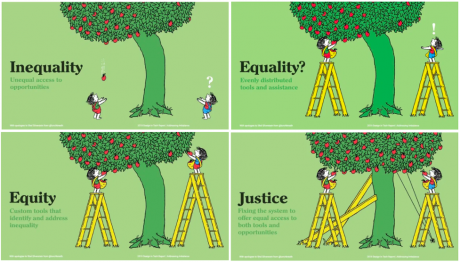
Psychological safety is employees feeling safe to be their full selves at work, in addition to feeling safe to voice opinions, thoughts, or ideas in a collaborative atmosphere. In a workplace with psychological safety, team members are not rejected for being their full self and mistakes are not often held against people. Employees will also feel safe to take risks, ask other team members for help, and more easily discuss difficult problems and issues (Edmonson, 1999, p. 26). Lastly, and potentially most importantly, all team members value and respect each other’s contributions to the workplace.
An important part of psychological safety is valuing diversity, equity, and inclusion. Employees feeling able to be their whole selves at work means they can exhibit their race, ethnicity, gender, sexual orientation, background, family status, and any other part of their identity without judgment. Intertwining psychological safety with diversity and inclusion efforts in the workplace allows employees to feel safe being themselves since their diversity is welcomed. Having a diverse workforce also improves employees’ productivity, increases innovation, and saves their organization money (Hunt et al., 2015; Nathan & Lee, 2015). Celebrating, valuing, and respecting others’ diversity will lead to psychological safety within work teams, fostering a more positive, open-minded, and better-performing workplace.

(Ruth, 2019)
Having psychological safety in the workplace has many benefits beyond employees feeling safe and comfortable. First, psychological safety improves employee performance by allowing more creativity and innovation since each employee feels safe to voice new ideas (Hutchison, 2020, April 8). Psychological safety also increases employees’ commitment to their organization, therefore increasing the retention of employees. Communication, engagement, and the sharing of knowledge improve, too, when psychological safety is present in the workplace. Employees tend to become more open to learning, including learning from failure since their failures are not held against them (Hutchison, 2020, April 8). Employees also have more positive attitudes in the workplace and have higher levels of initiative. Essentially, employees become more open-minded, resilient, motivated, and persistent when they feel safe, thus improving their performance (Hutchison, 2020, April 8).
How is psychological safety created if a workplace does not already have it? First, work teams need to create an understanding of what work the team does and why everyone’s input matters (Lagace, 2018). Also, acknowledge that every team member is their own person. Everyone has perspectives, opinions, anxieties, and vulnerabilities. Everyone wants to feel respected, appreciated, and happy (Delizonna, 2017). Using this understanding helps teams develop trust and respect. Next, proactively invite input from all members of the team. Asking for their opinions, thoughts, or ideas tells them they are wanted within the team. When team members speak up, respond supportively. Do not put their ideas or opinions down, or they likely will not feel safe to speak up again, and the trust and respect the team has been working to build will be damaged (Lagace, 2018). Team members can disagree with each other, but in a respectful and constructive way, preserving personal dignity while working creatively on a project or problem. Following these steps will help work teams build trust and respect for one another, creating psychological safety and all its benefits within the workplace.
 At a Glance
At a Glance
Psychological safety is employees feeling safe to be their full selves at work, in addition to feeling safe to voice their opinions, thoughts, or ideas without fearing they will be judged.
How to know if a workplace has psychological safety:
- People are not rejected for being unique
- Mistakes are not often held against people
- Employees feel safe to take risks
- It is easy to ask other team members for help
- It is easier to discuss difficult problems and issues
- All team members value and respect each other’s contributions
Diversity, Equity, and Inclusion within psychological safety:
- Employees feeling able to be their whole selves at work means they can exhibit their race, ethnicity, gender, sexual orientation, background, family status, and all other parts of their identity without judgment
- Diversity improves employees’ productivity, increases innovation, and saves their organization money
- Celebrating, valuing, and respecting others’ diversity will lead to psychological safety within work teams, fostering a more positive, open-minded, and better-performing workplace
Benefits of psychological safety in the workplace:
- Improved performance with more creativity and innovation
- Increased commitment to the organization, and therefore increased retention of employees
- Improved communication, engagement, and sharing of knowledge among employees
- Increased openness to learning, including learning from failure
- More positive attitudes among employees
- Increased levels of initiative
- Employees become more open-minded, resilient, motivated, and persistent when they feel safe
How to create psychological safety:
- Create an understanding of what work the team does and why everyone’s input matters
- Acknowledge that every person is their own person
- Proactively invite input from everyone
- Respond supportively to others’ input
 MSU In Action
MSU In Action
At MSU, the Office for Inclusion and Intercultural Initiatives (I3) encourages diversity and teaches departments how to be more inclusive of diverse people. I3 offers workshops, seminars, trainings, and certificate programs to teach MSU employees the value of diversity in the workplace and everyday life and how to discuss topics surrounding diversity, equity, and inclusion. Visit https://inclusion.msu.edu/education/index.html for more information on I3 or to contact them about an educational opportunity for MSU units. Additionally, the Gender and Sexuality Campus Center offers workshops on creating an inclusive space for people who identify as LGBTQIA2S+. While their resources are mainly geared towards students, their practices and workshops are relevant and can be applied to workplaces. See https://gscc.msu.edu/ for more information. MSU’s Women’s Networking Association (WNA) is also a place for women on campus to be their full selves. WNA connects professional women across campus through meaningful and empowering relationships, while providing an opportunity for women to network and support one another. WNA’s monthly seminars are on a variety of topics surrounding professional development and leadership building. Visit the WNA’s page at https://worklife.msu.edu/relocation-community/campus-connections/womens-networking-association for more information, or visit the WorkLife Office’s calendar for the schedule of WNA’s monthly seminars.
Resources on Campus
- Office for Inclusion and Intercultural Initiatives (I3)
- Encourages diversity and teaches departments how to be more inclusive of diverse people
- Offers workshops, seminars, trainings, and certificate programs to teach MSU employees the value of diversity in the workplace and everyday life and how to discuss topics surrounding diversity, equity, and inclusion
- Visit https://inclusion.msu.edu/education/index.html for more information or to contact them about an educational opportunity for MSU units
- For their workshops, see https://inclusion.msu.edu/education/diversity-and-inclusion-workshops.html
- For their seminars, see https://inclusion.msu.edu/education/learn-at-lunch.html
- For their certificate program on Understanding Implicit Bias, see https://inclusion.msu.edu/education/understanding-implicit-bias-certification-program.html
- Gender and Sexuality Campus Center
- Offers workshops on creating an inclusive space for LGBTQIA2S+ people. While their resources are mainly geared towards students, their practices and workshops are relevant and can be applied to workplaces
- See https://gscc.msu.edu/ for more information
- Employee Resource Groups
- Women’s Networking Association
- An association that connects professional women across campus through meaningful and empowering relationships, while providing an opportunity for women to network and support one another
- Monthly seminars are on a variety of topics surrounding professional development and leadership building
- Visit the WNA’s page at https://worklife.msu.edu/relocation-community/campus-connections/womens-networking-association for more information, or visit the WorkLife Office’s calendar for the schedule of WNA’s monthly seminars
- Family Employee Resource Group
- A group focusing on parents and caregivers of children and teens, which discusses family related topics with the goal of connecting, building community, and sharing best practices regarding raising or caregiving for children and caregivers
- Meets the second Thursday of each month during the academic year
- Visit the WorkLife Office’s calendar for meeting times and topics at https://worklife.msu.edu/calendar
- Adult Caregivers Employee Resource Group
- A group focusing on caregivers of adults/elders, allowing Spartans to connect and share information on topics such as how to start conversations on living situation changes, higher levels of care needed, caring for yourself as a caregiver, and making a home safe for a senior
- Meets the fourth Thursday of each month during the academic year
- Visit the WorkLife Office’s calendar for meeting times and topics at https://worklife.msu.edu/calendar
- EPIC: Employee Pride and Inclusion Coalition
- A coalition to create an inclusive and welcoming community that supports faculty, staff, and administrators of diverse sexual and gender identities. We view our work through an intersectional lens, centering those with multiple marginalized identities
- They strive to improve the campus climate for the MSU Lesbian, Gay, Bisexual, Transgender, Queer, Intersex, Asexual + (LGBTQIA+) community through policy development, creating community, promoting recruitment and retention of LGBTQIA+ faculty and staff, and sharing resources
- See https://www.facebook.com/groups/MSU.GLFSA/members/ for more information
- Coalition of Racial and Ethnic Minorities
- An organization bringing together Asian Pacific American Islander Desi American/Asian Faculty and Staff Association (APIDA/AFSA), Black Faculty, Staff & Administrators Association (BFSAA), Chicano Latino Faculty, Staff, Specialists and Graduate Student Association (ChiLA), and Educating Anishinabe: Giving, Learning, Empowering (EAGLE) to be an advisory council to the University
- The organization helps hold MSU accountable for monitoring, advancing, and supporting Diversity, Equity, Inclusion, and Engagement for historically underrepresented racial and ethnic students, staff, faculty, and administrators
- See http://bit.ly/CoREM to register with this organization
- Black Faculty, Staff, and Administrator’s Association
- An organization that serves as a change agent and collective voice promoting equity for Black faculty, staff, administrators, and students to pursue educational, scholastic, leadership, social, and professional development opportunities across all university environments and units
- See http://bfsaa.msu.edu/ for more information
- MSU Women of Color Community
- A group unifying Black, Arab, Asian, Chicana, Latina, Native, Indigenous, Pacific Islander, and biracial/multiracial identities. This community is open to all administrators, faculty, academic specialists, and staff colleagues
- To subscribe to WOCC’s listserv, email listserv@list.msu.edu and include the following command line in the body of the message (not the Subject): SUBSCRIBE WOCC@LIST.MSU.EDU
- Asian Pacific Islander Desi American/Asian Faculty Staff Association
- A group uniting Asian Pacific Islander, Desi American, and Asian Faculty and Staff
- See https://forms.gle/9dFpUdvKzgqMNnGk9 to register with this group
- ChiLa Association
- An advocacy organization for all Latinx faculty, staff, specialists, and graduate students
- The group is dedicated to maintaining an oversight posture in the areas of student enrollment, staff employment, community outreach, and research relevant to the experience and condition of Latinxs, to ensure that the Latinx community is equitably represented in all aspects of the university and to ensure that the university includes Latinxs in their outreach efforts
- See https://www.facebook.com/groups/2568239146524838 for more information
- Educating Anishinaabe: Giving, Learning, and Empowering
- The Native American faculty and staff group on campus
- See https://www.facebook.com/groups/1139699329548486/ for more information
- Veterans Resource Center
- A group dedicated to promoting the educational, career, and personal advancement of service members and veterans at MSU
- See http://veterans.msu.edu/ for more information
- Other Affinity Groups can be found at https://worklife.msu.edu/relocation-community/campus-connections
- Women’s Networking Association
 References
References
Delizonna, L. (2017, August 24). High-performing teams need psychological safety. Here’s how to create it. Harvard Business Review. https://hbr.org/2017/08/high-performing-teams-need-psychological-safety-heres-how-to-create-it
Edmonson, A. (1999). Psychological Safety and Learning Behavior in Work Teams. Administrative Science Quarterly, 44(2), 350-383. https://www-proquest-com.proxy2.cl.msu.edu/docview/203964176/fulltextPDF/57B20B7027B34E86PQ/1?accountid=12598
Hunt, V., Layton, D., & Prince S. (2015). Diversity matters. McKinsey & Company. https://www.mckinsey.com/~/media/mckinsey/business%20functions/organization/our%20insights/why%20diversity%20matters/diversity%20matters.pdf
Hutchison, J. (2020, April 8). Psychological safety and transparent communication at work: Strengthening collaboration and innovation [Video]. Zoom. Michigan State University WorkLife Office. https://worklife.msu.edu/events/psychological-safety-and-transparent-communication-work-strengthening-collaboration-and
Lagace, M. (2018, November 26). Make your employees psychologically safe. Harvard Business School. https://hbswk.hbs.edu/item/make-your-employees-psychologically-safe
Nathan, M. & Lee, N. (2015). Cultural Diversity, Innovation, and Entrepreneurship: Firm-level evidence from London. Economic Geography, 89(4), 367-394. https://www.researchgate.net/publication/259548515_Cultural_Diversity_Innovation_and_Entrepreneurship_Firm-level_Evidence_from_London
Ruth, T. (2019, March 11). Addressing imbalance [Infographic]. Design in Tech Report 2019, Section 6. https://designintech.report/2019/03/11/%F0%9F%93%B1design-in-tech-report-2019-section-6-addressing-imbalance/
